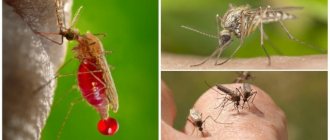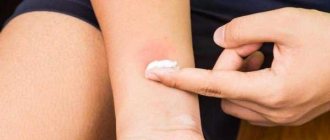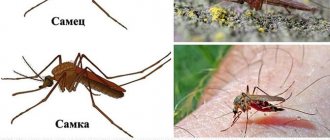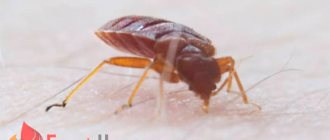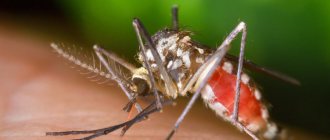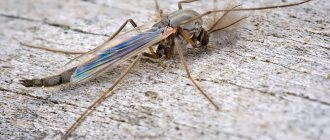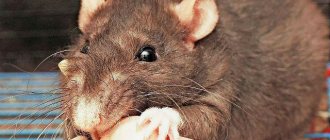In this article we will look at why mosquitoes bite some people more than others. And we will find out the criteria for their selection.
Mosquitoes can easily be called the most annoying insects in the world. Almost every second person among us has encountered them. A characteristic feature is a loud squeaking or buzzing, which often interferes with falling asleep at night or breathing fresh air in nature in the evening. But their bite is much worse. Moreover, a peculiarity has been noticed that insects love some people and bite them more often than others present. Therefore, we propose to understand this fascinating topic.
Why mosquitoes don’t bite everyone: a little about gender
A mosquito bite is something that sooner or later every resident of our latitudes will encounter with the onset of cool summer evenings. Everyone knows that mosquitoes are carriers of many dangerous diseases such as malaria, fever or tularemia. If previously these diseases were common only in exotic hot countries, today outbreaks of infections are increasingly occurring on our continent.
Important: According to medical statistics, about 40% of people suffer from allergies to mosquito bites. The reason the body reacts to a mosquito bite may be a weakened immune system. When an insect stings a person, substances are released along with saliva that, at the molecular level, prevent protein coagulation in the blood and block pain.
Before finding out mosquito preferences for the object of vinegar, it is worth finding out who the mosquito actually bites. After all, as we know, in the natural world, sexual differences play a significant role in behavior.
- A mature female mosquito lives from one and a half weeks to three months. At the first cold snap, mosquitoes die. In addition to blood, the sap and pollen of plants remains a necessary food product for the insect. If there is none in the apartment or house, the female dies after 3-4 days. Indoor flowers can significantly increase their lifespan and become an excellent wintering option.
- Being in an apartment, over time the mosquito does not disappear anywhere, but simply dies due to lack of food. Also, if the mosquito has managed to feed on blood and become fertilized, then the insect may well lay eggs in damp corners of the room, cellar or in the damp soil of even an indoor flower.
- Many people know that mosquitoes bite for a reason, but for a specific purpose. As a rule, it is the female mosquito that stings people. In order to feed their offspring. Male mosquitoes are more unpretentious in food and easily feed on plant sap, which is unacceptable for females.
- The amount of future offspring depends on the volume of blood consumed, since the female mosquito lays eggs every 3-4 days. And this increases the need for blood several times. In some possible situations, when a mosquito is not able to provide food to its offspring, its reproductive rate drops several times.
It's the female who bites
Bite mechanism
To understand how a squeaking mosquito bites a victim, it is necessary to study the mechanism and species characteristics of the insect. The mouthparts of the blood-sucking pest consist of six needles, which are covered with a special sheath. Only one pair is used to pierce the skin. Another pair of teeth is used to open the skin and penetrate blood vessels. The last pair of needles is used to find the blood vessel and suck out the plasma. During the feeding period, the insect injects a secretion into the wound, which provokes severe itching. To relieve swelling from a mosquito bite, it is necessary to use appropriate medications, folk remedies and ointments. This should be taken into account when studying how a mosquito bites.
Why some people are bitten more by mosquitoes: criteria for their selection
Scientists have proven the fact that mosquitoes do not sting everyone. There are many versions according to which blood-sucking insects select their victims.
- One of the possible options is a person's blood type . First of all, the female mosquito is interested in the protein itself, which is in the blood of a particular group. Mosquitoes are most often attracted to the first and third blood groups, while the second is not in demand.
- But there are also some nuances to this issue. The fact is that each blood is divided into two more subspecies, but according to Rhesus. So, mosquitoes choose a plus or positive Rh factor more often than a negative blood group. Even the one that is included in the so-called risk zone.
- There is also an assumption that mosquitoes are attracted to the carbon dioxide that a person emits when he breathes. Based on this theory, the more often a person breathes, the higher the risk of getting a mosquito bite.
- , the smell of alcohol, especially beer, is considered very attractive . They are attracted not only by the smell of ethanol, but also by an increase in human body temperature. After all, blood dilates blood vessels. Drinking people also produce more carbon dioxide than teetotalers.
Important : Many have noticed how a female mosquito is attracted to the heat that comes from lighting fixtures. The insect strives to get out of the twilight as soon as possible and get to the illuminated area. There is a receptor on the mosquito's proboscis that can detect heat. Based on this, the ideal solution would be LED lamps that do not heat up, thereby becoming unattractive to mosquitoes.
Mosquitoes smell heat
- Therefore, even athletes or those involved in physical labor or sports are at risk. After all, this entails an increase in body warmth , which attracts the female. It is also worth noting a certain feature - blood-sucking insects cannot tolerate air temperatures of +27 °C or higher. Under such weather conditions, female mosquitoes cannot fully demonstrate their activity. Although in the summer sometimes this rule does not apply to them.
Mosquitoes even prefer dark and red things
How do mosquitoes find their prey?
Mosquitoes find people by our movements, by the heat we emit and by our smell. When a mosquito flies past our ear, we hear a high-pitched ringing buzzing sound, the sound of the mosquito's tiny wings working.
Scientists believe that buzzing attracts members of the opposite sex, but it is especially tiring for us at night, when the heat makes it difficult to sleep. According to scientists, mosquitoes most often go out on their bloody hunt at night. With dawn, the warring parties can calm down and sleep, instead of exchanging deadly blows.
You sweat and have an elevated body temperature
Image: un‑perfekt / Pixabay
Strictly speaking, not only people who exercise a lot, but also anyone who sweats excessively are under the close attention of mosquitoes. Uric acid and ammonia present in sweat signal JI Raji. Aedes aegypti Mosquitoes Detect Acidic Volatiles Found in Human Odor Using the IR8a Pathway / Current Biology I'm going to fly off to see what's delicious.
It may seem that it is enough to spray with deodorant or cologne to fight off the smell of sweat. But according to This Is Why Mosquitoes Target Some People Way More Than Others/Self by Dr. Gary Goldenberg, medical director of the department of dermatology at the Icahn School of Medicine, some perfumes, on the contrary, only attract bloodsuckers more strongly. Mosquitoes find sweet scents especially attractive.
Solution. To combat excessive sweating, or hyperhidrosis, you need to make an appointment with a dermatologist. In addition, you just need to wash yourself more often.
You don't wash your feet
Image: Huỳnh Tấn Hậu / Unsplash.com
One experiment NO Verhulst. Composition of Human Skin Microbiota Affects Attractiveness to Malaria Mosquitoes / PLoS One 2011 showed a strong correlation between the number of bacteria living on the skin and mosquitoes' interest in that area. The largest colonies of microorganisms are located on people's ankles and feet, so bloodsuckers look at your bare legs with great interest.
Solution. Wash your feet. Do not stick them out from under the blanket.
Other biting insects
But mosquitoes are not the only type of insect that bites humans, and they are far from the most dangerous. There are still many who want to bite through human skin for one purpose or another:
- Ticks - a person usually does not feel their bite due to the anesthetic substance injected by the insect. The tick attaches itself to the wound and can remain on the skin for quite a long time, feeding on blood and growing in size. These insects carry many dangerous diseases - typhus, Lyme disease, encephalitis and others. If you find a tick, you should immediately seek medical help;
- Wasps and bees - these insects have a sting that is designed for self-defense. It contains a toxic substance. When it gets into the bite site, it causes swelling, pain, inflammation, itching, and redness. Such phenomena cause discomfort, but usually go away on their own. However, an allergic reaction may develop in the form of anaphylactic shock, a life-threatening condition. Bees only bite once because they leave a stinger in the skin during the bite. It needs to be removed as soon as possible. The wasp may bite again;
- Hornets bite very painfully, and their venom is more toxic than that of a wasp. After a bite, a person may feel cold in the limbs and difficulty breathing. If such symptoms appear, urgent medical attention is needed;
- Horseflies - their bites are very painful and can be accompanied by a sharp burning sensation, inflammation, swelling, even hematoma;
- Midges - scientists know a lot of such insects, about 4 thousand of them bite. Given their small size, they are not only annoying, but also painful. Sometimes an allergy to a midge bite develops;
- Fleas – severely itchy blisters remain at the sites of their bites, and purulent inflammation may develop;
- Flies - some of their species are also capable of biting. They often become carriers of intestinal and other infections. In addition, the bites are painful and cause redness of the skin;
- Ants - pustules form at the site of the bite, which can later turn into scars. It is possible that a severe allergy may develop due to the toxins contained in ant venom.
Lice, bedbugs, and even some types of cockroaches can also bite. Itching at the site of the bite increases the risk of infection: when scratching, the integrity of the skin is disrupted, and harmful bacteria easily penetrate into deep tissues.
How can a person be infected?
These individuals cannot be called harmless, because they are carriers of serious diseases, which include:
- Malaria.
- Encephalitis.
- Yellow fever.
- Tularemia.
- Dengue fever.
- Lymphatic filariasis.
Previously, diseases were common only in Asia and Africa, but now this problem affects all countries. To eliminate this problem, a special program “World Mosquito Program” was created.
It is aimed at making these individuals absolutely harmless; for this they are infected with the Wolbachia bacterium, which destroys any infection and prevents it from developing.
Mosquito sense of smell
Blood-sucking insects use their olfactory organ to search for prey and track repellents. This property is used by manufacturing companies that develop and produce insecticidal preparations and repellents. Modern sprays and aerosols eliminate the smell of human sweat and help relieve swelling. Therefore, pests bite some people hard, but do not notice people standing nearby. Some people use their favorite scented sanitary product to repel mosquitoes. This is another reason why mosquitoes are most likely to attack people who don't shower regularly.
Dependence of the number of bites on blood composition
To stop blood-sucking insects from biting, people use a variety of folk remedies. And especially popular are herbs that are planted on the plot or window sills. These properties of spices can be used by eating them. After all, spices change the composition of sweat. Therefore, insects do not approach those who eat cumin, turmeric and basil. To achieve the required result, it is necessary to consume spices at certain intervals.
The situation is similar with people who suffer from cancer. Once doctors detect cancer cells, they begin chemotherapy. Medications affect the composition of sweat. Blood counts are also taken into account. Pests do not react to people who have medications in their bodies. If people with cancer say, squeaking mosquitoes don’t bite me, then they are not lying. After all, their bodies contain a variety of chemical components. The exception to the rule is people who have leukemia. Some mosquitoes choose only leukemia patients.
Insects attack people who have alcohol in their bodies. Some mosquitoes have adapted to ethyl alcohol.

